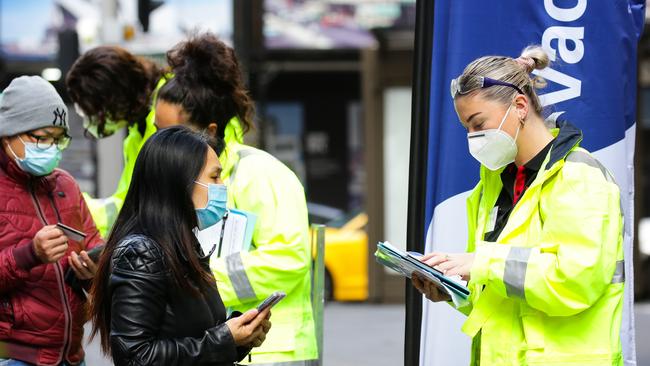Booster plea as ‘sister of Omicron’ spikes
The ‘sister of Omicron’ is believed to be spreading around NSW, triggering calls for caution and for a mass increase in booster uptake.

The spread of an even more contagious “stealth variant” of Omicron has prompted health authorities to call for a mass uptake of booster jabs as restrictions ease and Australia enters peak virus season.
The BA.2 sub-variant – dubbed the “sister of Omicron” – has already been detected in at least 70 countries, including Australia, and is thought to be becoming the dominant variant in NSW after a huge case spike on Thursday. NSW recorded 16,288 cases, its highest daily number since January, and a spike of more than 3000 compared to the previous reporting period.
NSW Health Minister Brad Hazzard attributed the surge to relaxed restrictions, the community “switching off” from the pandemic, and the spreading BA.2 variant. Mr Hazzard said a study from the University of NSW showed the variant may cause cases to “more than double” within the next six weeks.
“While the community may have gone to sleep on the virus, the virus hasn’t gone to sleep in the community,” he told a budget estimates hearing on Thursday, pointing to the slow uptake of booster shots. Little more than 65 per cent of eligible Australians have received their booster jabs, with NSW the least boosted state at 60.5 per cent triple dosed.
“The virus is still out there and it can wreak havoc if we don’t go and get our boosters fast,” Mr Hazzard warned.

Epidemiologist Catherine Bennett echoed Mr Hazzard’s advice, warning that the BA.2 variant may be more contagious, but was unlikely to cause a “whole new wave again” – especially now that the state was out of the “big wave” of BA.1, and with the ongoing booster rollout.
Professor Bennett said data from Denmark, where BA.2 accounted for 50 to 81 per cent of cases, showed the variant was 33 per cent more infectious than the original Omicron strain.
“In Denmark … they had 40 times the cases (compared to Delta) but their hospitalisations were only 50 per cent higher with the Omicron outbreak,” she said.
The variant doesn’t seem as severe or deadly – which Professor Bennett said was a testament to the success of vaccines at protecting against Covid and its variants.
“It’s really the booster that works against Omicron,” she said. “It also means that as some other variant comes along, that’s probably also going to be covered by the booster in a better way than our primary course.”



